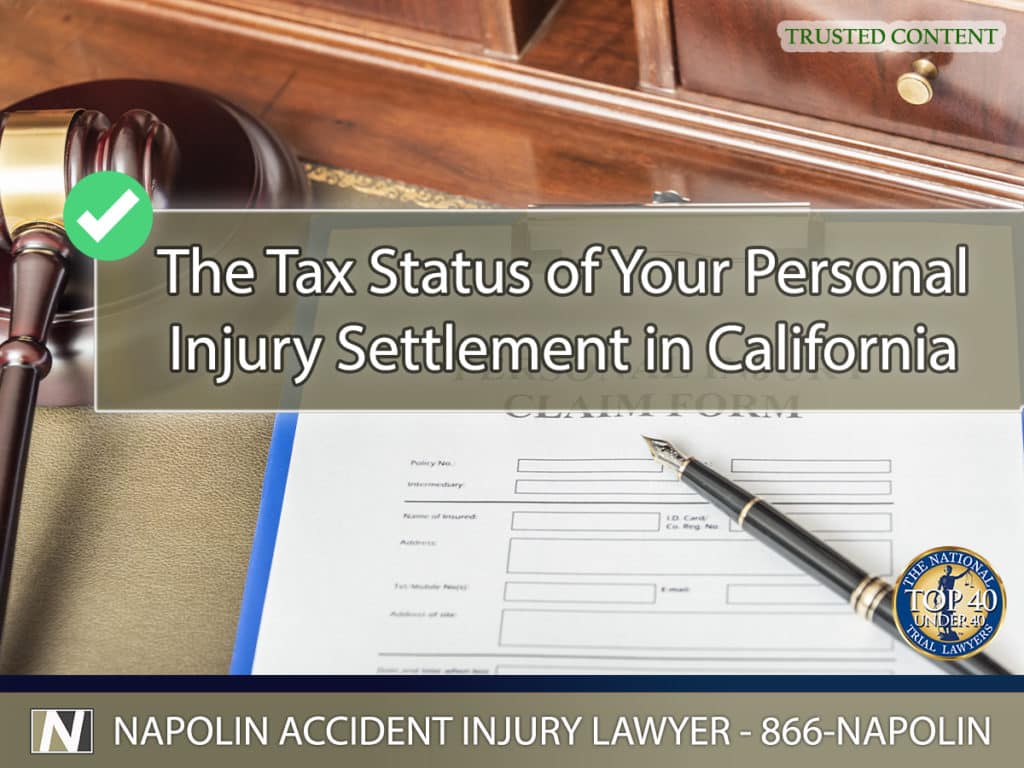In the realm of personal injury law, financial compensation plays a pivotal role in aiding victims' recovery. However, the intersection of legal settlements and tax obligations often creates a complex landscape for those navigating personal injury claims in California. This article aims to shed light on the nuances of tax implications for personal injury settlements, offering crucial insights for individuals seeking justice and compensation for their injuries.
Comprehending Personal Injury Settlements
Personal injury settlements are financial compensations awarded to individuals who have suffered harm due to the negligence or intentional actions of others. These settlements serve as a monetary remedy, covering various damages such as medical expenses, lost wages, emotional distress, and pain and suffering. Understanding the nature and composition of these settlements is essential for grasping their tax implications.

The General Rule of Non-Taxability for Personal Injury Settlements
The General Rule of Non-Taxability for Personal Injury Settlements
In California, the default position is that personal injury settlements are not subject to income tax. This principle stems from the understanding that the compensation received is not a gain but a restitution for losses incurred. As such, these settlements are typically excluded from taxable income, aligning with the broader objective of making the victim whole.
Identifying Exceptions to Non-Taxability for Personal Injury Settlements
Despite the general rule, certain components of personal injury settlements can be taxable. These exceptions include punitive damages, which are awarded in cases of egregious conduct, and interest accrued on the settlement amount. Additionally, portions of settlements that compensate for lost wages or profits may also fall under taxable income.
Detailed Overview of California's Legal Stance Regarding Personal Injury
California's legal framework regarding the taxability of personal injury settlements is closely aligned with federal tax laws. The state's statutes and legal precedents distinguish between compensatory damages, which are typically non-taxable, and punitive damages, which are subject to taxation. This distinction is crucial for accurately assessing the tax obligations arising from a settlement.
Exploring Non-Taxable Settlement Categories
A wide array of personal injury settlements in California are categorized as non-taxable. These include compensations for physical injuries resulting from various incidents like motor vehicle accidents, workplace-related injuries, and incidents of premises liability. Additionally, settlements for medical malpractice and wrongful death claims also typically fall under this non-taxable bracket. Understanding these categories helps in anticipating the tax implications of one's specific settlement.
Scenarios Where Personal Injury Settlements May Be Taxable
Scenarios Where Personal Injury Settlements May Be Taxable
There are specific scenarios where elements of a personal injury settlement might be taxable. For instance, if a settlement includes compensation for lost wages or business income, these portions might be subject to taxation as they are considered replacements for taxable income. Similarly, punitive damages, which are awarded as a form of punishment rather than compensation, are usually taxable.
Preparing for Potential Tax Obligations
For individuals receiving personal injury settlements, it's prudent to prepare for any potential tax obligations. This preparation involves understanding the composition of the settlement and seeking advice from legal and tax professionals. Accurate assessment and guidance can prevent unforeseen tax liabilities and ensure compliance with state and federal tax laws.
Understanding the Tax Status of Your Personal Injury Settlement in Ontario, California
Understanding the Tax Status of Your Personal Injury Settlement in Ontario, California
The intricacies of personal injury settlements and their tax implications necessitate professional legal guidance. If you are navigating the aftermath of a personal injury and require assistance, reach out to Napolin Accident Injury Lawyer at (909) 962-8415 for a free consultation. Our team, with its extensive experience in personal injury law across California, is dedicated to ensuring that your rights are upheld and that you are fully informed about the financial aspects of your settlement. We are committed to providing comprehensive support, helping you understand the tax status of your settlement and guiding you through the legal process with expertise and care.

